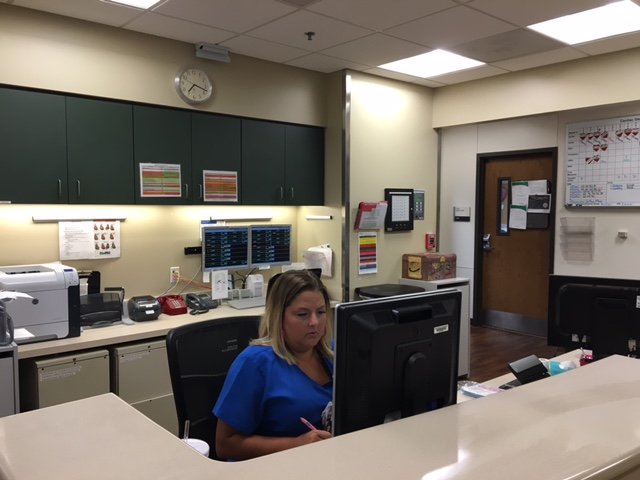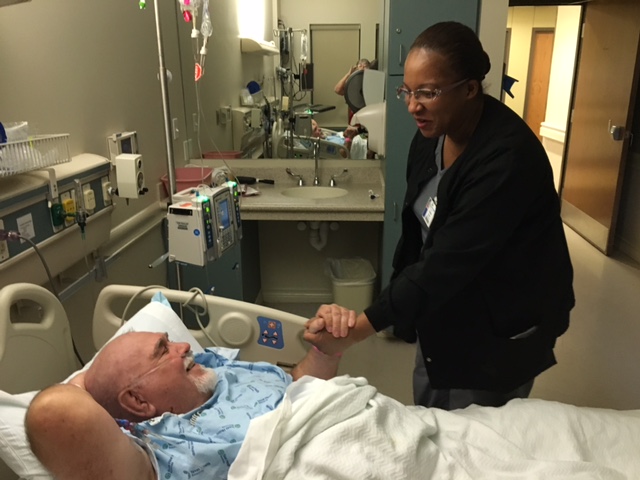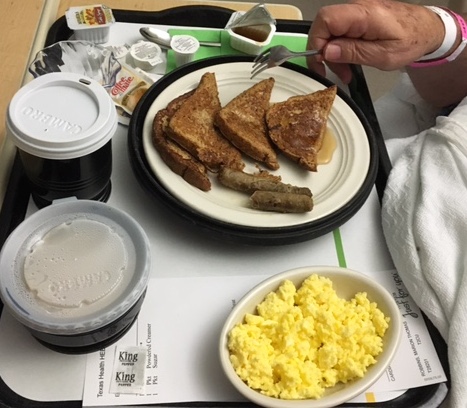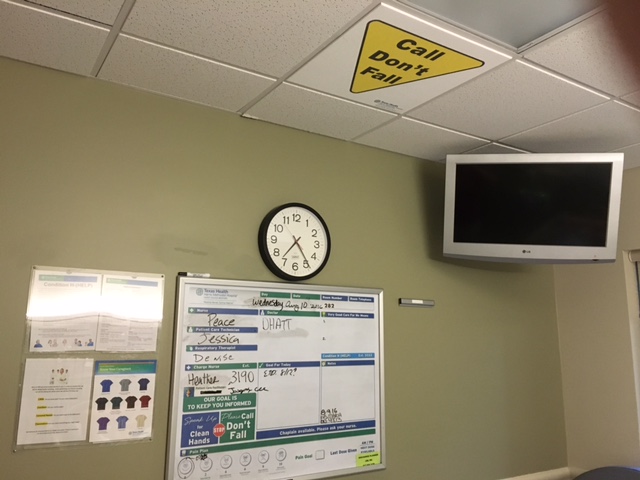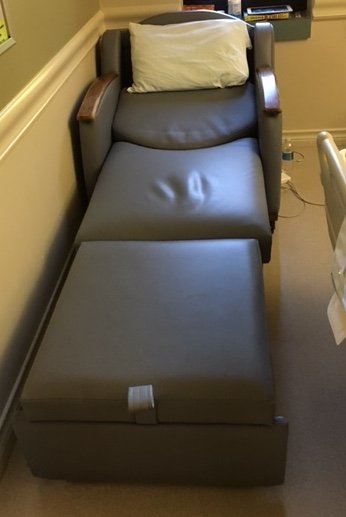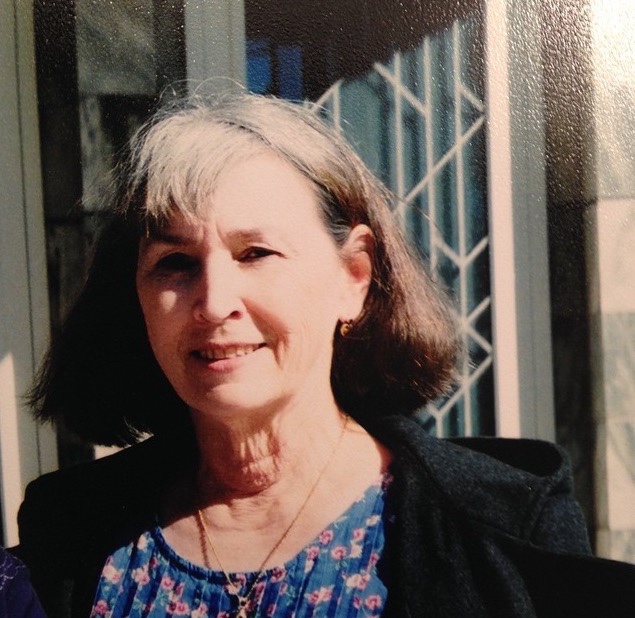hospital stay
As we get older, even though we try to eat healthier and exercise more, we sometimes get sick. My husband recently went into atrial fibrillation. It was certainly a wake-up call for us, because we had no clue this could happen, although we should have had. We have been here, at the hospital, for seven days. His A-fib is complicated by the fact that he had weak kidneys already, and some needed medicines are not good for the kidneys.
Six ways to stay out of the hospital
If you do go to the hospital, you only want to go as a visitor..
- Pay attention to your body. If you start to be short of breath after mild exertion, go to the doctor. If you have trouble swallowing food, go to the doctor. Anything different might be a problem. If you just plain don't feel good, call your doctor.
- If you notice water retention, go to the doctor. Check your ankles and hands and feet for puffiness. Weigh yourself every morning to make sure your weight is stable. You might be gaining because you are retaining fluid, not fat.
- If you work in the heat of the day outside, do not stay out in the sun too long. It is easy to get busy and forget until you have heat stroke. Since this can trigger other disorders, it is imperative avoid this. A few years ago, my husband was on a motorcycle trip with his brothers and rode too long one day in the heat. He ended up in the hospital with heat stroke and kidney problems. Drink plenty of fluids while in the heat.
- Pain is a warning sign for our bodies. If you begin to have pain, and you don't know what is causing it, go to the doctor. You won't always have pain during serious illnesses, so if you have other symptoms, don't wait for the pain.
- Know the warning signs for major illnesses and diseases that are common for your age. Cancer, diabetes, heart disorders, whatever it is, know what the signs are.
- Eat healthy food and exercise daily. The prevention is much better than the cure.
I know, you don't want to seem like a hypochondriac, but it is better to go to the doctor and get checked out than end up in an ambulance, or when you finally go to the doctor he sends you straight to the hospital.
What we found at the hospital
|
The sign on the ceiling which said, "Call Don't Fall" was good to remind patients not to get up without calling the nurse for help. I would probably notice the sign after I had fallen and was looking up at it. For the guest bed, there were wonderful warm blankets to keep a visitor cozy at night. |
What is it like in the hospital?
Oh my, what a question. We have three specialists plus the house doctor and a nurse, personal care technician, respiratory therapist and charge nurse. They are in and out of the room so often that the patient rarely sleeps. Well, the doctors only come once a day but the nurses are wearing a path in the floor. It is a "catch a wink" when you can atmosphere.
They are fairly laid back about visitors. The unit we are on is cardiopulmonary so there are some very sick people on the floor, but visiting hours are 24/7 and include children. I have yet to see any pets, but who knows. We have had visits from my husbands brothers, sister, in-laws, children, grown grandchildren.... often all at once. There are only two chairs plus the one that says "physicians only" and hangs on the wall so they stand around the room. The chair situation is probably to discourage people from staying forever. We enjoy the visits although it might be a lot for some patients. Did I mention that I am sleeping at the hospital. I have a chair that opens to a bed (sort of).
In this wing, there is only one patient per room so family is allowed to spend the night. If there were more patients in the room, I couldn't spend the night. I would probably hang out in the waiting room or visitor's lounge.
In many ways this is better than the old days when almost nobody was allowed to visit patients, although those patients probably got more rest. I think the personnel in those days was not so numerous.
If you are in the hospital these days, you can learn about each medication and diagnosis that you have. There is something called "My Care" which is an online program that explains what you have, treatment methods and medications you are being given. They give all of your lab test results.
They are very careful that they have the right patient when they dispense meds. They always scan your hospital bracelet and ask you to give them your name and birthdate. My husband appears to be tired of repeating this, but it is for his own good. They also tell you what medication they are giving you. I like that they are careful.
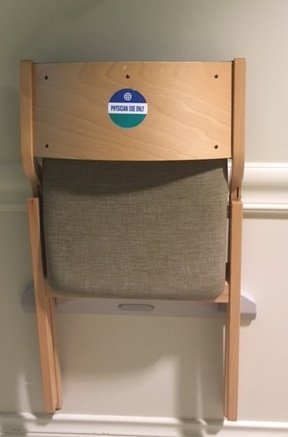 |
Here is the chair labeled Physician chair only which we were able to use when we had guests. We never saw a physician sit in any chair. They stood by the bed and examined the patient. They stood by the bed and explained things. I am not sure doctors are allowed to sit, but I bet they would like to. |
Hospitals Back in the Day
In my younger days this is what would have happened:
- Father's waited in the waiting room for their newborns to arrive.
- Maternity patients often stayed ten days at the hospital. I had a baby fifty years ago with only one doctor and one nurse. Everyone survived.
- Patients were alone in their rooms while their family waited outside for visiting hours. Patients probably got more sleep.
- Nobody signed a paper for everything that happened. You signed to be admitted and had little control after that. Years ago I had surgery and afterward the doctor said to me, "Oh by the way, I took your appendix out while I was at it." It didn't occur to me that wasn't the thing to do. It would never happen today (can't say I've missed that appendix though).
- Patients didn't get a choice of food.
- Those under 12 and in some places 16 could not visit. Visiting hours were limited.
- Often there were wards with many beds. Today there are usually private or semi-private rooms. There are pros and cons to both these situations.
- Patients did not have access to health and medical information. Today the when the doctor says you have "whatever", the patient and of course all of the visitors whip out their computers and phones or tablets and do research. Doctors shake their heads a lot I think.
- It was cheaper back in the day.
I believe most of the changes are good, some are not. We didn't go to the doctor often when we were growing up in the fifties, but when we did, the price was not so high that you had to have insurance and supplements to pay for your care. Prices have crept up and out of sight while we were running through the sprinklers and walking to school. Maybe the pendulum will swing on this. I am hoping so.
Home from the hospital
We are now home. Tom is not well yet. He is taking so much medication, while only a week and a half ago he took none. One of the medicines is to lower his thyroid. He has never had thyroid problems before, but evidently his thyroid began to be overactive which affected his heart rate and put him in atrial fibrillation. He still has an irregular heartbeat, but it is being controlled with the medication. When his thyroid calms down, he might go into a sinus or regular rhythm on his own. If not, he well need ablation, which is basically a shock to the heart to get it going correctly. "Ouch!"
During his hospital stay, Tom was given an ultrasound of his thyroid gland which showed a couple of small cysts, but nothing physical that would have caused the malfunction. I am researching thyroid problems. You can see my research by clicking here. (even though it is not finished)
After a hospital stay, there is nothing better than being in your own home, saying hello to your pets, and getting a full nights sleep. My husband has improved so much just by being home.
On a lighter note
Why spending a week in the hospital is not so bad--especially for a housewife.
- Breakfast in bed every single day (all meals in bed)
- You don't have to lift a finger to make the bed or sweep the floor.
- You get visits from all of your relatives -- granted if too many come you might need to wonder about your mortality. Make sure they are smiling a lot. If they are looking sad you will want to go home.
- Naps are allowed.
- Somebody else is at your house cleaning the kitchen.
- Is all this worth a needle in your arm? I'm thinking about this one still.
- When I was staying in the hospital with my husband, I didn't get breakfast in bed but the other items above applied. I think most dark clouds have a silver lining. Of course, no needles for me. There was no choice though, if my husband was going to stay in the hospital, I needed to be there to cheer him on and let him know that I care. Love and family are the best medicines.
